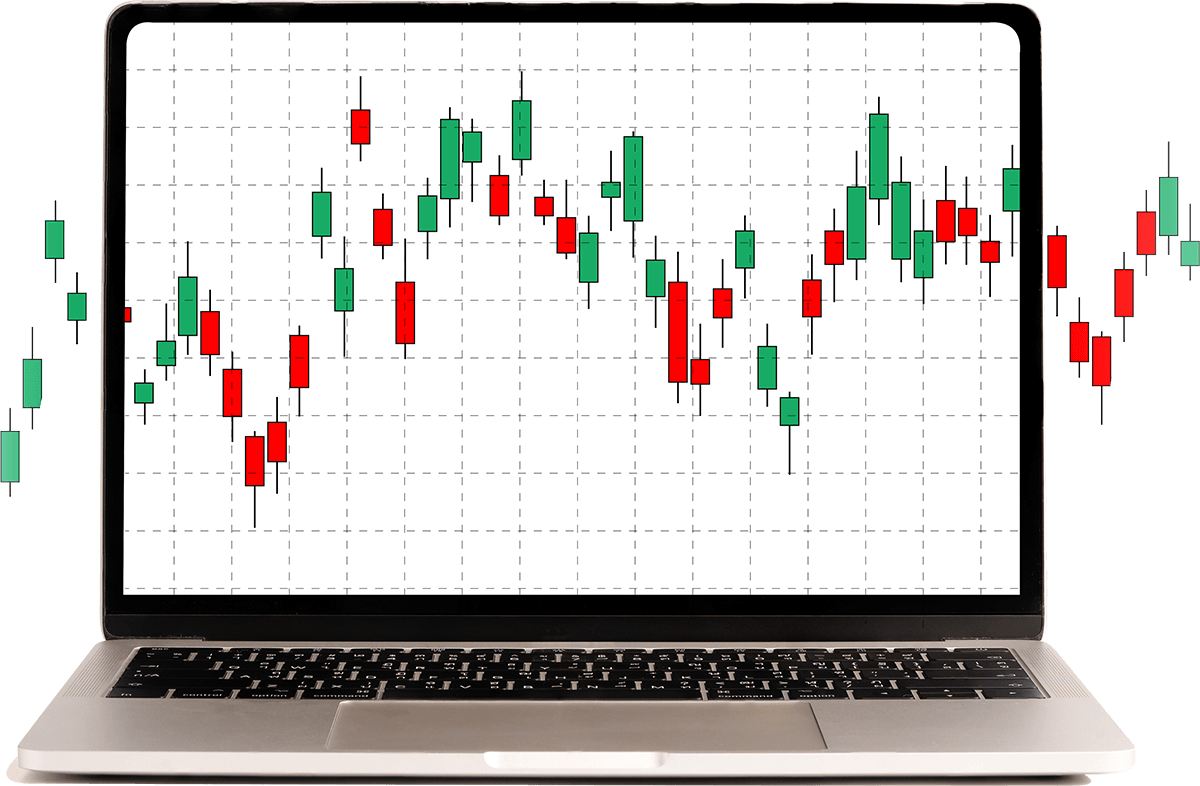


Buyers of futures contracts are obligated to take delivery of the underlying asset when the contract expires, and sellers are obligated to deliver.
![]()
Futures track a wide range of commodities and financial assets. While futures started with agricultural products like corn and cattle, stock indexes, like the S&P 500 and the NASDAQ-100, now dominate the market. Traders can use futures to speculate on price movements without having to take possession of the underlying assets.
Futures are a relatively straightforward way to position for the stock market going up or down. And now, thanks to Micros, scalability and size adjustment are a huge part of the story for the increasing popularity of futures contracts.
So, what exactly are futures contracts, and how do they fit into your investment strategy? Read on to learn more.
A futures contract is an agreement to buy or sell an asset on a public exchange at a specific price and date in the future. Futures contracts track the value of the underlying asset, which could be a commodity, stock, currency, or bond.
The buyer of a futures contract is obligated to take possession of the underlying asset at the expiration date of the contract, and a seller has the obligation to make the asset available on that stipulated date as well. Some contracts require the delivery of a physical asset, such as crude oil, while others, such as contracts on the S&P 500 index, are cash-settled.
Futures have two uses: hedging for risk management and speculating. Hedgers use futures contracts to lock in delivery dates and prices to mitigate the risks of market fluctuations and uncertainties. Hedgers, or commercial traders, can also go long or short to protect against price fluctuations. For example, a refinery with too much crude oil in storage can short crude oil futures.
Speculators use futures contracts to take both long and short positions, depending upon their view of the direction of the market. Traders typically do not intend to take possession of the underlying asset.
Therefore, they close out their positions before the expiration date of the contract to eliminate any obligations.


Futures contracts state a specific quantity and are standardized for trading on an exchange. A futures contract specifies the quality, quantity, date for delivery, and location for the delivery of the asset. Futures contracts of a specific asset, such as soybeans or copper, are identical, which makes the process for trading and transferring ownership relatively simple. The only variable is a fluctuation in the market price of the contract.

Contract expiration months vary depending upon the specific underlying asset. To illustrate, the trading months for soybean contracts are January, March, May, July, August, September, and November, while copper contracts are traded all 12 months of the year.

Futures contracts are traded on an exchange like the Chicago Mercantile Exchange (CME) 1 , and investors are required to have an account approved by a brokerage firm like TradeStation in order to trade futures. The Commodity Futures Trading Commission (CFTC), a federal agency, regulates the trading of futures contracts.
Suppose a farmer and a soybean meal manufacturer want to limit their risk and control their costs of operation. A farmer may want to lock in a price to sell their crop, so they know exactly how much money they’re going to receive and avoid a potential loss from declining prices. The manufacturer of soybean meal may want to lock in a price to purchase soybeans to assure delivery of the product, control production costs, and avoid price increases.
To meet the needs of both parties, the farmer sells a futures contract to deliver a certain quantity at a specified date, and the manufacturer buys the contract to accept delivery on the agreed-upon date.
Futures contracts are highly leveraged, meaning traders have the ability to control a large number of assets with a relatively small amount of capital. Margin requirements typically range from 3-10% of the underlying contract value and are the same for both long and short positions.
The high leverage gives traders the chance to make substantial returns on their invested capital. However, the reverse is also true. The high leverage can also result in a significant loss of invested capital.

Important Information: This content is for informational and educational purposes only. This is not a recommendation regarding any investment or investment strategy.
Investing involves risks. Past performance, whether actual or indicated by historical tests of strategies, is no guarantee of future performance or success. There is a possibility that you may sustain a loss equal to or greater than your entire investment regardless of which asset class you trade (equities, options, futures, or digital assets); therefore, you should not invest or risk money that you cannot afford to lose. Before trading any asset class, first read the relevant risk disclosure statements on the Important Documents page, found here: www.tradestation.com/important-information.
Futures offered through TradeStation Securities Inc. TradeStation Securities, Inc., TradeStation Crypto, Inc., and TradeStation Technologies, Inc. are each wholly owned subsidiaries of TradeStation Group, Inc., all operating, and providing products and services, under the TradeStation brand and trademark. When applying for, or purchasing, accounts, subscriptions, products and services, it is important that you know which company you will be dealing with. Please click here for further important information explaining what this means.
© 2024 TradeStation. All rights reserved.
Past performance, whether actual or indicated by historical tests of strategies, is no guarantee of future performance or success. There is a possibility that you may sustain a loss equal to or greater than your entire investment regardless of which asset class you trade (equities, options, or futures); therefore, you should not invest or risk money that you cannot afford to lose. Online trading is not suitable for all investors. View the document titled Characteristics and Risks of Standardized Options. Before trading any asset class, customers must read the relevant risk disclosure statements on our Agreements and Disclosures page. System access and trade placement and execution may be delayed or fail due to market volatility and volume, quote delays, system and software errors, Internet traffic, outages and other factors.
TradeStation Securities is a member of SIPC, which protects securities customers of its members up to $500,000 (including $250,000 for claims for cash). TradeStation Securities’ SIPC coverage is available only for securities and for cash held in connection with the purchase or sale of securities, in equities and equities options accounts. Explanatory brochure available upon request or at www.sipc.org.
TradeStation Securities, Inc. and TradeStation Technologies, Inc. are each wholly owned subsidiaries of TradeStation Group, Inc., both operating, and providing products and services, under the TradeStation brand and trademark. When applying for, or purchasing, accounts, subscriptions, products and services, it is important that you know which company you will be dealing with. Please click here for further important information explaining what this means.
Tell us what your interested in
By continuing, I consent to the terms in the Privacy Notice and Cookies Policy.
Our call-back scheduling system is currently offline while we observe today's holiday. We will resume taking call back requests at 8AM ET on the next regular business day.
Our call-back scheduling system is currently offline, but is available Monday - Friday, 8AM to 5PM ET.
Our call-back schedule is currently full for the rest of the business day.
By continuing, I consent to the terms in the Privacy Notice and Cookies Policy.

The requested call back time is no longer available.
Please go back and choose a new time and try again.
Our records indicate the phone number provided is already scheduled for a call-back during the time selected.
To schedule another call please go back and choose a new time and try again.
Our call-back schedule is currently full for the rest of the business day.
An unexpected error has occured in scheduling your call-back request.
Please browse our FAQ or contact us directly for further assistance.
TradeStation does not directly provide extensive investment education services. However, useful investment and trading educational presentations and materials can be found on TradeStation’s affiliate’s site, YouCanTrade.com, which is owned by You Can Trade, Inc., an investment education media company.
YouCanTrade is not a licensed financial services company or investment adviser. Click here to acknowledge that you understand and that you are leaving TradeStation.com to go to YouCanTrade.
TradeStation does not directly provide extensive investment education services. However, useful investment and trading educational presentations and materials can be found on TradeStation’s affiliate’s site, YouCanTrade.com, which is owned by You Can Trade, Inc., an investment education media company.
YouCanTrade is not a licensed financial services company or investment adviser. Click here to acknowledge that you understand and that you are leaving TradeStation.com to go to YouCanTrade.
You are leaving TradeStation Securities, Inc. and going to TradeStation Crypto, Inc. TradeStation Securities and TradeStation Crypto are separate companies.
You are leaving TradeStation Securities, Inc. and going to TradeStation Crypto, Inc. TradeStation Securities and TradeStation Crypto are separate companies.
You are leaving TradeStation.com and going to TradeStation Technologies, Inc.
You are leaving TradeStation.com and going to TradeStation Technologies, Inc.
TradeStation Securities, Inc. is an SEC-licensed broker dealer and a CFTC-licensed futures commission merchant (FCM), and a member of FINRA, SIPC, CME, NFA and several equities and futures exchanges, which offers to self-directed investors and traders Equities accounts for stocks, exchange-traded products (such as ETFs) and equity and index options, and Futures accounts for commodity and financial futures and futures options (TradeStation Securities does not offer Crypto accounts).
TradeStation Crypto, Inc. is neither a securities broker dealer nor an FCM, and offers to self-directed investors and traders cryptocurrency brokerage services under federal and state money services business/money-transmitter and similar registrations and licenses (TradeStation Crypto is not a member of FINRA, SIPC, CME, NFA or any equities or futures exchange, and does not offer Equities or Futures accounts).
TradeStation Technologies, Inc. is a software development company which offers analytics subscriptions that self-directed investors and traders can use to chart, analyze and design back-tested strategies for Equities, Options, Futures, Forex and Crypto markets (TradeStation Technologies is not a financial services company).
You Can Trade, Inc. is an online educational, news and entertainment media publication service that seeks to provide to the public a marketplace of potentially actionable investment and trading content, ideas, demonstrations and informational tools. You Can Trade is not an investment, trading or financial adviser or pool, broker-dealer, futures commission merchant, investment research company, digital asset or cryptocurrency exchange or broker, or any other kind of financial or money services company, and does not give any investment, trading or financial advice, or research analyses or recommendations, or make any judgments, hold any opinions, or make any other recommendations, about whether you should purchase, sell, own or hold any security, futures contract or other derivative, or digital asset or digital asset derivative, or any class, category or sector of any of the foregoing, or whether you should make any allocation of your invested capital between or among any of the foregoing.
TradeStation Crypto accepts only cryptocurrency deposits, and no cash (fiat currency) deposits, for account funding. In order for you to purchase cryptocurrencies using cash, or sell your cryptocurrencies for cash, in a TradeStation Crypto account, you must also have qualified for, and opened, a TradeStation Equities account with TradeStation Securities so that your cryptocurrency purchases may be paid for with cash withdrawals from, and your cryptocurrency cash sale proceeds may be deposited in, your TradeStation Securities Equities account. Therefore, if you want to open a TradeStation Crypto account, you must also have an Equities account with TradeStation Securities. This cash in your TradeStation Securities Equities account may also, of course, be used for your equities and options trading with TradeStation Securities.
TradeStation and YouCanTrade account services, subscriptions and products are designed for speculative or active investors and traders, or those who are interested in becoming one. No offer or solicitation to buy or sell securities, securities derivative or futures products of any kind, cryptocurrencies or other digital assets, or any type of trading or investment advice, recommendation or strategy, is made, given or in any manner endorsed by any TradeStation Group company, and the information made available on or in any TradeStation Group company website or other publication or communication is not an offer or solicitation of any kind in any jurisdiction where such TradeStation Group company or affiliate is not authorized to do business. Past performance, whether actual or indicated by historical tests of strategies, is no guarantee of future performance or success. There is a possibility that you may sustain a loss equal to or greater than your entire investment regardless of which asset class you trade (equities, options, futures, futures options, or crypto); therefore, you should not invest or risk money that you cannot afford to lose. System access and trade placement and execution may be delayed or fail due to market volatility and volume, quote delays, system, platform and software errors or attacks, internet traffic, outages and other factors. The trademarks “TradeStation®,” “YouCanTrade” and “SheCanTrade,” as well as other trademarks, domain names and other proprietary intellectual property of TradeStation Group companies, are owned by TradeStation Technologies. The proprietary TradeStation platform is offered by TradeStation Securities for Equities (including equity options) and Futures trading. TradeStation Crypto offers its online platform trading services, and TradeStation Securities offers futures options online platform trading services, through unaffiliated third-party platform applications and systems licensed to TradeStation Crypto and TradeStation Securities, respectively, which are permitted to be offered by those TradeStation companies for use by their customers.
Please also read carefully the agreements, disclosures, disclaimers and assumptions of risk presented to you separately by TradeStation Securities, TradeStation Crypto, TradeStation Technologies, and You Can Trade on the TradeStation Group company site and the separate sites, portals and account or subscription application or sign-up processes of each of these TradeStation Group companies. They contain important information, rights and obligations, as well as important disclaimers and limitations of liability, and assumptions of risk, by you that will apply when you do business with these companies.